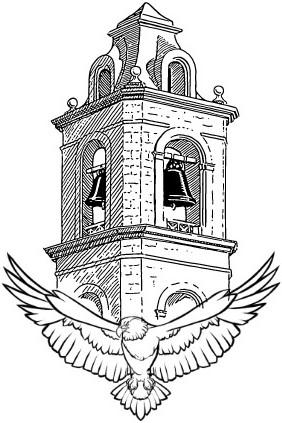
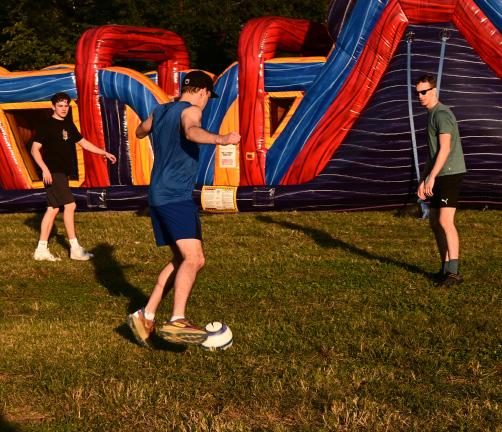
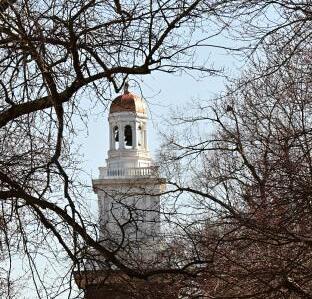
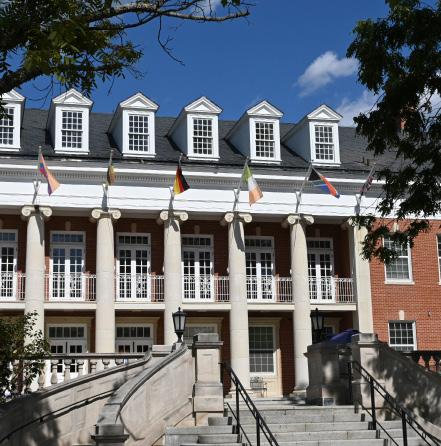
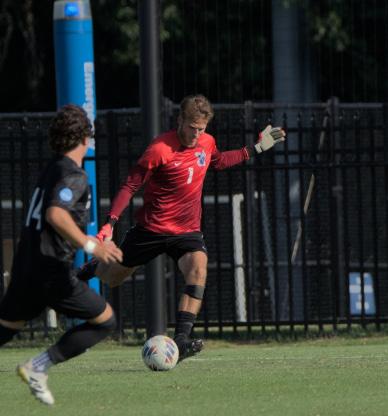






Editor-in-Chief
Callie Harkins
Executive Editor
Ky Huynh
KY HUYNH Executive Editor
weeklyringer.executive@gmail.com
Associate Editors
Emma Kingkeo
Grace Wagner
Thomas Jackson
News Editor
Meaghan Van Dyke
Opinion Editor
Ella Cordle
Life Editor
Chloe McCann
Sports Editor
Enya Cea-Lavin
Online Editor Sophia Tompkins
weeklyringer.online@gmail.com weeklyringer.sports@gmail.com weeklyringer.life@gmail.com weeklyringer.opinion@gmail.com weeklyringer.news@gmail.com weeklyringer.associate@gmail.com
Photography Editors
Anna Goodman
Violet Ayers
weeklyringer.photos@gmail.com
Copy Editor
Kyra Donlon
weeklyringer.copy@gmail.com
Faculty Advisor
Sushma Subramanian
weeklyringer.eic@gmail.com ssubrama@umw.edu
Corrections
Please report any corrections to Callie Harkins at weeklyringer.eic@gmail.com or Sushma Subramanian at ssubrama@umw.edu
Advertisement
Please direct all advertising inquiries to Callie Harkins at weeklyringer.eic@gmail.com.
Bell tower logo designed by Bernadette D’Auria ‘22
After nearly 18 months of being closed to students and faculty, Executive Director of University Communications Amy Jessee announced that Monroe Hall is open for classes following the completion of the roof reconstruction. The construction was a two-year project, replacing water damage from previous roof leaks.
According to The Weekly Ringer, on Jan. 30, 2024, Jessee sent an email sharing that the building would be closed for a week due to building inspection and roof repairs. Two days later, Jessee announced the closure of Monroe Hall on Feb. 1 for the rest of the Spring 2024 semester.
Rosalyn Cooperman, professor and chair of the department of political science and international affairs, described when she realized the closure of the building would be extended.
“It’s been amazing having classes in Monroe. It’s nice because I don’t have to travel too far anywhere.”
- Caty Taylor
“I think initially, many people thought that this would be a temporary displacement and then, as they recognized the nature of the repairs that needed to occur, that’s when we received the message that we would be out for a while,” she said.
Caty Taylor, a junior history and American studies double major, whose classes were relocated out of Monroe during the
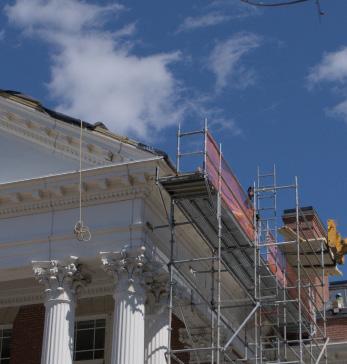
closure, wanted more consistent communication about the roof reconstruction.
“It would have been nice to have an extra email or two here and there, but I also understand the school’s busy and they’re juggling all of these projects,” she said. “But for me, that was a huge relocation because my entire academic career is in that building for my major.”
In addition to the roof being restored, Facilities Services says the project also involved new walls, ceilings and floors or carpeting.
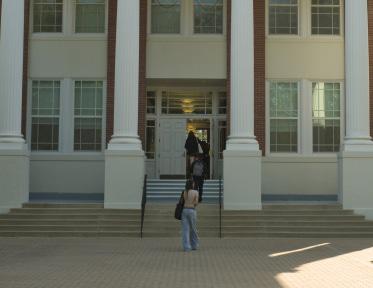
“Everything was repainted and refurbished, but other than those basic cosmetic fixes, hopefully we have a roof that doesn’t leak,” said Cooperman.
Nabil Al-Tikriti, associate professor of history and American studies, spoke on the faculty’s concerns about the process of returning to Monroe Hall.
“Everything was repainted and refurbished, but other than those basic cosmetic fixes, hopefully we have a roof that doesn’t leak.”
- Rosalyn Cooperman
“It kept getting longer, and then it became an issue of do we trust it will really be moving back this summer,” he said.
Students like Taylor also had reservations about the timeline of the reopening.
“I remember when I was registering for classes, Monroe was the first room that was offered in Banner,” she said. “It wasn’t Combs and Monroe. It was just Monroe.” Cooperman expressed her excitement for faculty members to be back in their office space at Monroe Hall.
“We’re delighted to be back in one space, to be teaching in the building in which we have offices that allow for just a stronger connection between us and our students, and so we’re absolutely delighted,” said Cooperman.
Taylor has four classes in Monroe Hall this semester and is pleased with the shorter travel distance between classes.
“It’s been amazing having classes in Monroe,” she said. “It’s nice because I don’t have to travel too far anywhere.”
“It kept getting longer, and then it became an issue of do we trust it will really be moving back this summer.”
- Nabil Al-Tikriti
Additional projects, such as the Simpson Library stair tower repairs, are complete, but additional construction to the building, including rebuilding the brickwork on the east face, is still scheduled to commence this year. Woodard and Seacobeck Hall have a newly completed waterline between the two buildings. The university will now start a stream restoration project to stabilize the banks of the stream and prevent water erosion. Having been repaired and resealed, the top floor of Alvey Parking Deck is now open, but the Marshall and Russell lots are closed for the construction of the new theatre.
ELLI CUSSON Staff Writer
At an ideal school, every student should feel heard, but in my experience, the University of Mary Washington has a hard time applying this notion. I transferred to UMW my junior year. The previous two schools I attended weren’t a match, so I decided to try another. What I first noticed about students’ behavior at UMW was that there seemed to be no hesitation in regards to giving opinions, because the sentiments were never challenged. Everyone seemed so solid and steadfast in their identities to the point that they seemed incapable of being wrong.
“We need to acknowledge that as students, we are prone to staying inside our comfort zone of closed-mindedness and do something about it.”
- Elli Cusson
For my freshman year of college, I attended Liberty University, and through that experience, found that UMW and LU sit on two different sides of a spectrum.
These universities’ student populations are prime examples of individuals who were influenced by environments that reinforced their beliefs through repetition. They echo the opinions that they’ve always heard, and because of this familiarity, there’s an incentive to attend a school that already aligns with their beliefs.
Liberty was founded with ties to Southern Baptist Churches in Virginia, whereas UMW was not. As someone who isn’t Baptist, LU students hold many radical opinions, but so do those at UMW.
Both schools have highly vocal, opinionated groups. At one school, there are praises being thrown towards a specific political party, and at the other, curses. Everything is black and white with seemingly no room for negotiation. Liberty is this way because they abide by “The Liberty Way,” which places students in an environment controlled by the school’s religious values. As a result, students will only be exposed to content told from that perspective.
On the other hand, UMW’s administrators don’t implement these same kinds of rules. Instead, opinions are reinforced through student and professor social interactions. The company we choose to keep affirms what we already believe, making it harder for us to enjoy the company of those who disagree. This idea complements the argument that we submerge ourselves in voices that echo our thoughts back at us, instead of branching out to listen to new ones.
“We have the potential to be more than a judgmental student population.”
- Elli Cusson
In multiple classes I’ve taken at UMW, professors and students have never shied away from putting in their two cents. As a person with beliefs that might diverge from either school’s vocal opinion, I’ve never felt comfortable voicing them.
When I told friends I had made at LU that I was Catholic, they stepped back to process my words as if they couldn’t believe it, but so did UMW students. Neither of

the schools offered a tolerant climate to exchange opinions without blowing up in response.
UMW needs to abide by its own values. At our school, we claim to be more open-minded than LU, but we don’t realize that we’re just as much a part of the problem.
Imagine if we did branch out. We could draw comparisons in arguments to see mutual overlap and areas of concern. We’d learn different approaches to solving issues from diverse backgrounds, and aim to find mutual understandings. Not only that, but we would grow in our personal opinions, determining what we value and what we don’t based on opinions that can withstand questioning.
In UMW’s ASPIRE guidelines, it states students should strive to have respect and civility as well as a sense of engagement. I usually keep my religious life private from my UMW friends unless they ask because of fear of judgment.
I’ve had someone stop talking to me because they assumed I might act a certain way because of my religion. We need to acknowledge that as students, we are prone to staying inside our comfort zone of closed-mindedness and do something about it.
I’ve paid witness to casual debates between students that took place on UMW campus, but they weren’t quite productive conversations. Oftentimes, it would be
before or after class, brought up because hot topics like Elon Musk and the presidential election were making the rounds.
What stood out to me was these individuals engaging in “debates” weren’t looking to understand new perspectives, but instead waiting for their turn to retort. It was brick wall against brick wall.
The only impact the conversations made were the solidification of each’s own argument. Because there was no give, students became increasingly frustrated. What’s the point of having a discussion when nothing has been accomplished?
This can be changed. It comes down to understanding why students believe what they believe.
We can also educate ourselves while doing so. Instead of thinking of something to contradict what someone else says, ask why they think that way. It might not be your natural instinct to do so, but give it a try.
“By listening to what others say, not only are you understanding each other’s background, but you’re also making other students feel heard.”
- Elli Cusson
Debates are meant to be an exchange in which you attempt to have a conversation that enlightens both parties. By listening to what others say, not only are you understanding each other’s background, but you’re also making other students feel heard.
The worst thing that we could do is keep the current situation the way it is. Because if we do, we’ll keep living like hypocrites who only want to listen to someone they can agree with.
UMW has the opportunity to incorporate ASPIRE to its fullest extent. We have the potential to be more than a judgmental student population. Based on how open-minded we want UMW to be, we should aim to be tolerant and open to new ideas, and we can’t do that by pointing fingers at one another and parting ways miserably.
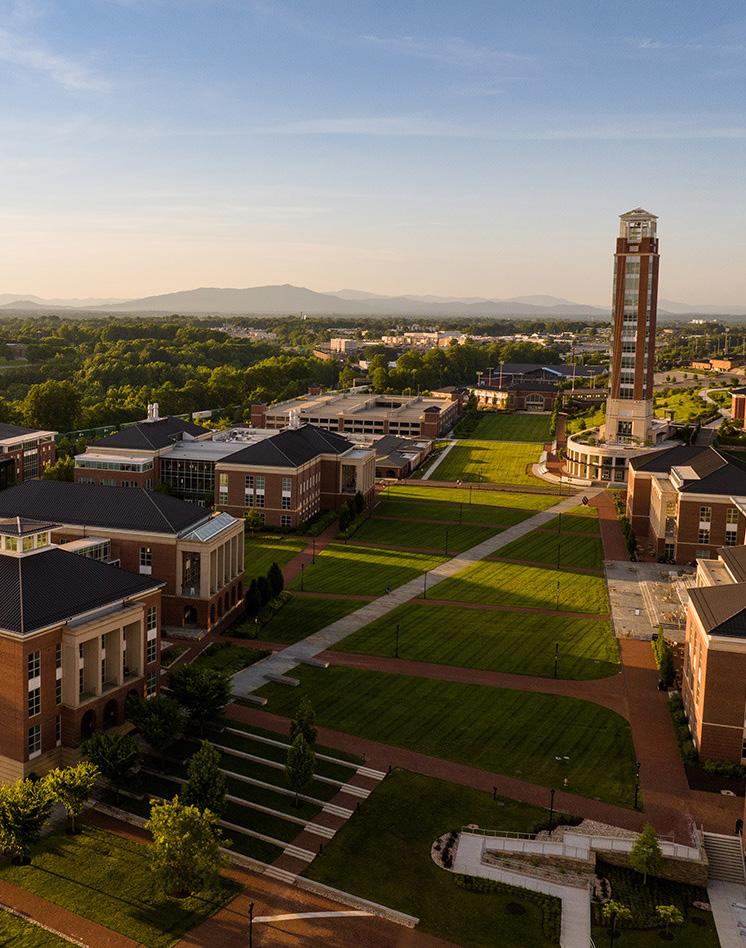
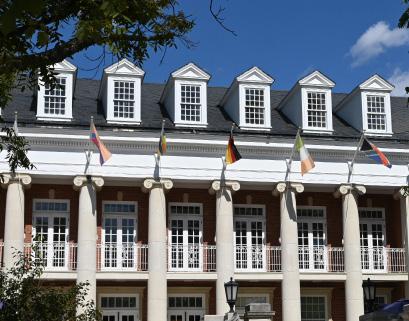
it would have been nice to be part of a peer group that connects you with other local students. However, we adapted and joined some freshman events but quickly noticed our expectations were different.
Most students come straight from high school and are under 21 years old, which shapes the type of events hosted for first year students. Still, Playfair and Eagle Gathering made for unforgettable experiences because they were so unique to UMW.
Community is a huge focus at UMW. Stepping on campus, you feel like you are part of a big family where everyone is proud to be an Eagle. Just like a typical American university is portrayed abroad, students here routinely wear UMW-branded apparel to class.
It’s those small, unique quirks that give UMW its very own character, as does Sammy D. Eagle who always appears at campus events and the “Get Dirty, Go Wash” motto that’s chanted in excitement.
and it’s common to take a gap year, travel or simply take more time before starting university.
In the U.S., most students go directly to university after high school. They seem motivated, get involved in clubs and community projects and contribute to campus life nearly immediately. This makes the campus feel young and dynamic comparatively.
Without a car, you’re stuck. Since it doesn’t make sense to buy my own car because I’m only in the U.S. for 10 months, grocery shopping often requires calling an Uber. Daily life revolves around cars, with drive-thrus and parking lots everywhere. Even though the Eagle Express and Fredericksburg bus system exists, it doesn’t give you much flexibility to explore things outside of a limited range.
Three weeks ago, I boarded a plane in Frankfurt, Germany headed for the United States. A year abroad was about to begin.
For months, I debated where to go—Erasmus in Spain or a university exchange in Asia?—In the end, I opted for 10 months in the U.S.
America has always been part of my life, even while in Europe: through movies, TV shows and music, the culture reached me across the ocean. Today this influence is mainly found on Instagram, YouTube and TikTok, so I had this feeling of already knowing about the country and its people.
I took the leap and found myself in the charming little town of Fredericksburg, Virginia.
From the first few days at UMW, I realized that life here is very different from my university in Germany.
Campus Cosmos
In Germany, university is almost exclusively about studying. Here, it’s about living your entire life on campus. You don’t just move to Fredericksburg — you move to UMW.
With around 3,800 residents, the campus is a small town of its own. Most days, there’s no need to leave campus. Food, coffee, books, sports facilities and even clothes — of course all branded with the UMW logo—can be found just outside my dorm.
Student life revolves around shared living, with classes, clubs, community activities and evenings all spent together. In Germany, students usually head home after class. Meetings happen in cafes or bars, and the university plays a smaller role in daily life.
In Germany, orientation or “New Student Welcome” week means pub crawls, drinking games and getting-toknow-you activities. The drinking age is 16 years old for beer and wine, and 18 years old for hard liquor and spirits. This naturally influences the way many campus parties and student events are organized, and much of the festivities revolve around drinking off-campus.
Choosing courses and exploring the campus is secondary. Everyone is busy meeting new people in a fun, chaotic atmosphere.
At UMW, exchange students were not offered much of an official program separate from the events created for all freshmen and transfers. We had a general orientation that gave us information about how things work at UMW, but
There are countless activities like weekly bingo, karaoke or campus barbeques, that bring students together. Recently, I really liked the First Friday BBQ on Ball Circle that had music, good food and ice cream.
Back home in Germany, universities are more of a place to study, and less of a place to call home. Merch is quite rare, there’s not a strong “we-feeling” across the campus and faculty mostly stick to themselves. Sadly, we don’t have a mascot either, which I think is really unfortunate.
Yes, it’s true: Americans are friendly.
Every day, someone wishes me a great day. People are curious, they ask questions like where I’m from and how I’m enjoying UMW and the U.S. so far. The encounters are often surface-level, but the friendliness is heartwarming.
In Germany, people are much more reserved and are usually more direct. When I go back, I’ll miss the little celebrations of effort, like clapping in class when someone does well, the openness and the encouragement.
Workload is Real
The workload in the U.S. is definitely higher than in Germany. Homework, regular exams and class participation are expected. Students are expected to stay on top of assignments, prepare in advance and balance clubs, volunteering or whatever other extracurricular they are part of. Every day here is packed.
In Germany, many students start studying seriously only two weeks before exams. Participation in clubs or sports is much less common, usually limited to a few sport classes that are incorporated into standard curriculum.
Sports aren’t just extracurricular here—they shape campus life. Even as a Division III school, athletes enjoy prestige, wear team gear proudly and draw crowds to games. Supporting the Eagles is part of daily life. This is why I’m excited to try out some different sport clubs, including tennis, badminton or UMW Girl Gains.
In Germany, universities don’t have official teams. Gyms and fitness classes exist, but athletic culture isn’t as prominent. Professional support is limited unless you attend a specialized sports university. Whereas at UMW, workout classes are offered at the campus gym and there are several clubs and organizations focused solely on getting students active.
At my German university, I was the same age as my classmates, but at 23 years old, I feel noticeably older here. At home, students graduate after 12 or 13 years of school
Public transport is limited compared to that in Europe. You can get almost anywhere by bus, train or walking. As a European, I really need my daily walks and miss pedestrian-friendly streets where people can simply stroll and meet up. Everything seems to revolve around traffic and stoplights here.
Being a student in the U.S. is expensive. Tuition, housing and a meal plan is mandatory for nearly all freshmen. Daily expenses unrelated to academics are high too. I saw toilet paper for over $20, which blew my mind. I know that education in the U.S. is a privilege, but I’m still surprised by the costs, especially compared to European prices. A semester at the most expensive public university costs around $460. Housing is more affordable, and students can live on a budget with cafeteria food for €2.
Living and studying at UMW has already encouraged me to see things differently, and that’s exactly the point of studying abroad: to gain a new point of view and broaden your own world. I can’t wait to see what else UMW has in store.
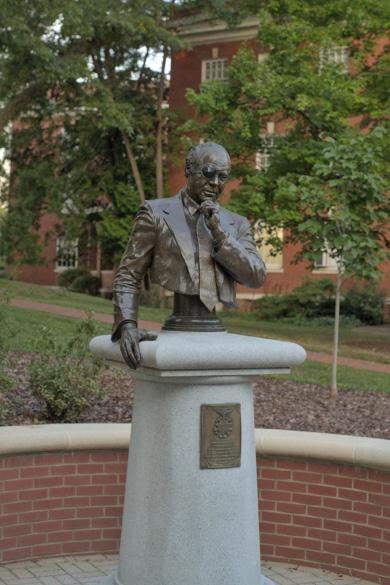
AMAL SURANI Staff Writer
As the summer air slowly cools, the fall semester at Mary Washington brings in a fresh wave of freshmen. New, confused and unsure, in a place they are scrambling to make their home. Watching these first-years step foot onto the Fredericksburg campus, their sophomore upperclassmen reminisce about when they were in that position, just a year ago.
“I feel like freshmen don’t really know what’s going on,” said sophomore psychology major Gunnar Garrett. “The whole campus feels like a maze,” he said, remembering what it was like for himself as a freshman.
Similarly, sophomore political science major Carly Gillian’s first year was filled with confusion as she navigated the expansive campus.
“As a freshman, I was just very lost,” she said. “I didn’t really know my way around.”
To help find his place on campus, Garret participated in the New Experiences for Students Transitioning (NEST) program ahead of his freshman year. New Student Programs (NSP) creates and coordinates events that aim to prepare freshman and transfer students as they transition to college. NEST is one of the pre-arrival programs offered as a part of NSP, along with Soft Landings, one specialized for neurodivergent students.
“I basically found ‘my people’ through there,” said Garrett about NEST.
Sophomore V Vargas-Perez recalls her first time on the Mary Washington campus and all the emotions associated.
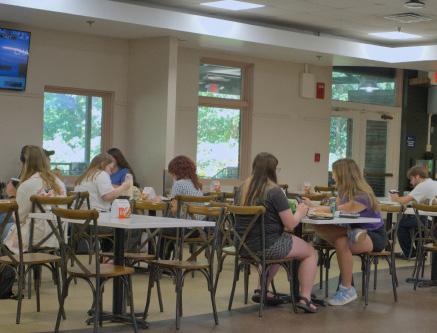
“I was more closed off to the idea of finding my people,” she said. “I was like, well, I’ve already found my people back at home.”
Vargas-Perez compared her experience as a sophomore to that of freshman year.
“As a sophomore, I feel like even if you hadn’t gotten the chance to learn about a lot of stuff, they kind of expect you to already know that and have some basic understanding of the programs available to you,” she said.
By the second semester of her first year at Mary Washington, Vargas-Perez came to the realization that she was nearing the end of her freshman year and had survived her first year as a college student. A similar feeling hit Gillian during that summer.
“I did a lot of reflecting on what I want my next year to look like, or things that I learned,” Vargas-Perez said.
“I think there’s still a lot of things, like making new friends, that I did last year that I think I could do better with this year,”
- Isabel Sowry
Done with the chaos of their first year on campus, these students found a stronger sense of confidence in their environment and in finding the people they spend their time with.
Garrett specifically found comfort as a sophomore working as a Resident Assistant.
“Being an RA has been huge,” he said. “It’s helped me expand my social horizons and learn how to be more comfortable with myself and with other people.”

a new year comes new challenges and goals for
opportunities for
The journey towards feeling like an insider within the UMW community varies, and it’s normal to go through this period feeling like you are lost or missing something—everyone does at some point.
Vargas-Perez’s roommate and friend, Isabel Sowry, is a sophomore theatre major who spent her first year learning and adapting to her new, independent living environment.
“I learned how to live with another person, manage my time and do more independent things I didn’t do in the past,” Sowry said.
But she admits that isn’t the end of the road.
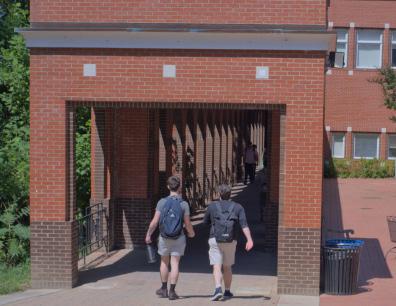
“I think there’s still a lot of things, like making new friends, that I did last year that I think I could do better with this year,” Sowry said
Whether or not students like Sowry feel as if they have officially matured into upperclassmen, or if they have yet to find out where they truly belong in UMW, they are far from where they first started when they set both feet on campus.
For the freshman reading this, take a breath. The first year can be hard, but if we sophomores made it through, you can too.

hammers as they shaped and assembled the parts. With so much energy in the shop, time seemed to fly by.
struck gallery installation. I chose to reclaim and repurpose that plywood. The design was playful and fun. The serious part was measuring, cutting, sanding and fixing mistakes. Nearing the end, a weak leg gave way. Fortunately, after some reinforcement and some creative problem solving, it stood tall, and I was confident to let it bear weight. That mix of work and creativity was what made the class so special.
By the final, the studio felt like a comfortable creative space. We were all very comfortable working together. For the critique, we shared our stories, expressed our successes and the obstacles we overcame, as well as our frustrations and lessons learned, highlighting the progression from initial sketches to the finished product. Everyone had something tangible to hold and a story to tell about how it came to be. We concluded on a positive note and left with more than we started with.
“Everyone had something tangible to hold and a story to tell about how it came to be. We concluded on a positive note and left with more than we started with.”
- Richard Simpson
When I signed up for the Fundamentals of Furniture Making course this summer, I wanted to learn from someone who truly knew the craft. Professor Lawrence Hinkle isn’t just skilled with wood; he is fun and energetic, has a genuine love for the craft and a wealth of knowledge from a lifetime of experience. He studied with James Krenov at the College of the Redwoods (now The Krenov School), one of the finest woodworking schools in the world, and is a graduate of the Historic Preservation department at the University of Mary Washington. That in itself was reason enough to sign up, but once Professor Hinkle shared some of his ideas for the course with me, I was all the more eager to commit.
We began with a project that seemed simple: building sawhorses. The idea was to build a set of sawhorses using only joinery, without the use of nails, screws or other fasteners. We quickly realized that we would need to be precise with our measurements and remember to measure twice and cut once. With students of all skill levels working side by side, it quickly became apparent that patience, timing and sharing space, tools and responsibilities were essential.
“That mix of work and creativity was what made the class so special.”
- Richard Simpson
Each student was trained and took turns on the chop saw, table saw, drill press, band saws and sanders. We cut the pieces to length on the chop saw first, then squared them on the table saw. Finally, we used the drill press, a dado blade and a band saw to cut the joints. It was a flurry of activity: the whir of machines and dust collectors, the ringing of saw blades and the percussion of mallets and
We worked diligently to complete our sawhorses. Everyone had the experience of chipping away material from joints with chisels, rasps, files and sandpaper, to fit the finished parts together to make a complete sawhorse. It was fun to witness each one come to life. There was a shared joy and gratification in seeing your own or another student finish a set of sawhorses. We all encouraged and cheered each other on.
“Most of all, I was reminded that learning doesn’t just happen in books and traditional classrooms.”
- Richard Simpson
For extra inspiration before our final assignment started, Professor Hinkle invited Josiah Stinson, a local teacher and woodworker, to tell stories from his classroom and shop. His stories were filled with wisdom and humorous anecdotes. He also brought in examples of his work for us to inspect. His words echoed what Professor Hinkle had shared with us, that woodworking isn’t just about making something. It’s about the journey as much as the result. It is also about problem-solving, respecting the materials, letting the piece take you where it leads, taking risks and learning from your mistakes. We were inspired.
Once the sawhorses were done, we dove into our dream projects. We were given a wide berth, so the studio came alive with variety: a rocking chair, a bench, a footstool, a bed, multiple shelves and a nightstand. Everyone set off on their own path.
My path was a three-legged, baseball-themed stool with a home plate-shaped seat and baseball bat-shaped legs.
My personal challenge was to create everything out of reclaimed plywood. There were leftover materials from a
The structure of the course made it all possible. Five weeks, four days a week, entirely in the shop, and it felt like a woodworking camp for university students. The steady rhythm kept us focused, provided visible progress and created a space for us to work on our projects. It was over before we knew it, and I could have spent the entire summer in the studio full-time. It was a great experience. It was over too soon, but it is a pleasant memory from the summer sessions.
If you’ve ever thought about trying woodworking, or if you’re curious how creativity and craft connect, I can’t recommend this course enough. Whether you want to build furniture or become more comfortable with tools, this class will help you achieve your goals.
In the end, I left with more than a piece of furniture. I left with new skills, new friends and a deeper respect for the craft. Most of all, I was reminded that learning doesn’t just happen in books and traditional classrooms. Sometimes it happens when you put your hands on a material and start to work with it. So if you get the chance to try something new, GO FOR IT!
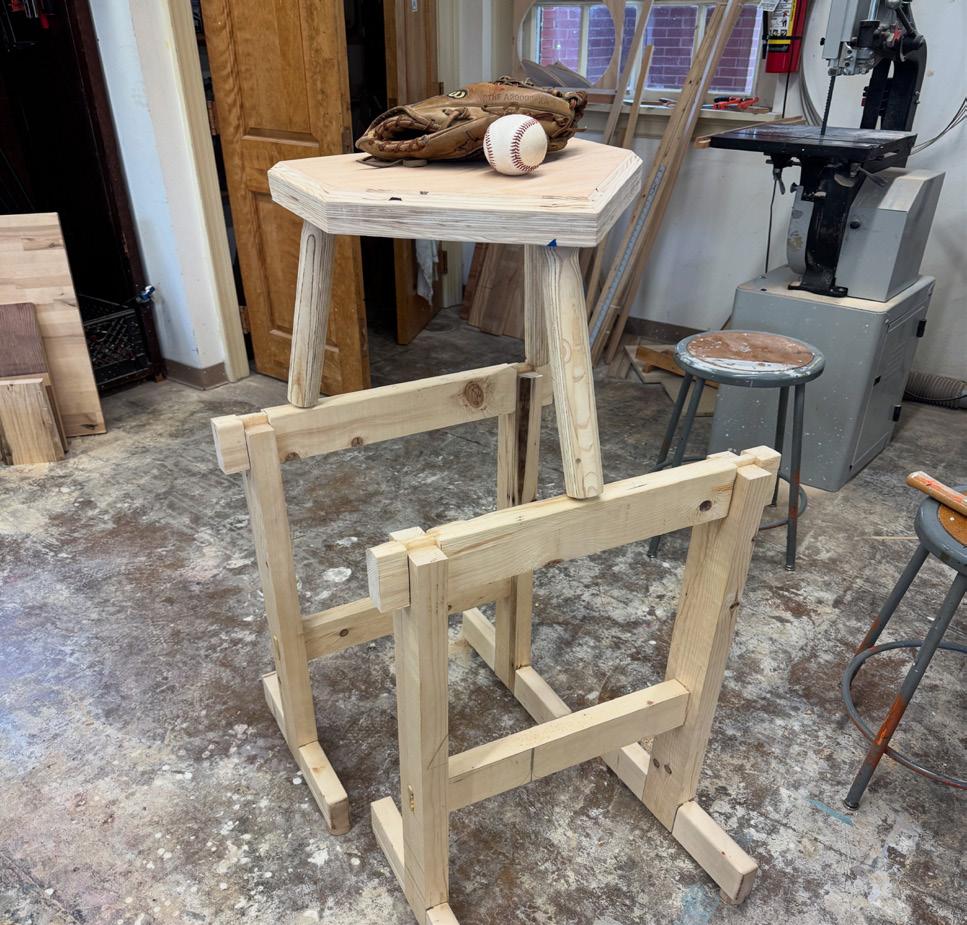
MEAGHAN VAN DYKE News Editor
The Crime Column is based on UMW Police reports from July 21 to Sept. 3.
Trespassing
On July 21 at 9:13 a.m., there was a case of trespassing at the Heating Plant. This case was referred to SOW.
COLE RASMUSSEN Staff Writer
Get Dirty, Go Walsh! In May, Mike Walsh joined the University of Mary Washington’s faculty as the Vice President of Student Affairs. Walsh stepped into the role previously held by Juliette Landphair, who now works as the Associate Vice President of Health and Wellness.
Walsh says he was drawn to UMW because he grew up in Virginia and wanted to focus on “an ethic of care,” a teaching philosophy that focuses on students from an all-encompassing perspective. He explained that this philosophy involves attending to students’ entire selves.
“It gives educators a framework that’s totally non-judgmental to allow people to feel accepted for who we are,” he said.
Walsh said he has “always looked upon Mary Washington very highly. I easily could have gone here, had I not chosen William and Mary.”
Trespassing
On Aug. 1 at 5:52 p.m., there was a case of trespassing at the Battlegrounds. This case was referred to Frederickburg PD.
Larceny
On Aug. 7 at 2:14 p.m., there was a case of larceny at the Jepson Alumni Center. This case is pending.
Vandalism
On Aug. 7 at 2:20 p.m., there was a case of vandalism at the Stafford Campus Parking. This case is pending.
Larceny of a Scooter
On Aug. 13 at 3:24 p.m., there was a case of larceny of a scooter at Randolph Hall. This case is pending.
Walsh previously worked at the University of Portland as the Associate Vice Provost and Dean of Student Life, as well as at Oregon Health and Science University as the Vice Provost of Student Affairs. He has been working in student affairs since he attended the College of William and Mary where he obtained a bachelor’s degree in history. He earned his master’s in education at the University of Vermont and his doctorate in higher education and student affairs at Portland State University.
Walsh says he wants to build relationships with students by attending events and eating lunch at the Cedric Rucker University Center as often as he can.
“I also really want to be out with students and faculty and staff,” he said.
“I want to be someone who’s out and about on campus and present and available.”
- Mike Walsh
“I try to eat my lunch at the CRUC every day and go to as many events as possible,” Walsh said. “I want to be someone who’s out and about on campus and present and available.”
He continued, “Hopefully students over time will get to know me well and know that I’m approachable and I’m here for them.”
According to many student leaders, Walsh has already managed to make a positive impression.
“He personally emailed the leadership of New Student Programs to thank us for our work in both the programs and welcoming him and the new students to UMW,” said Destiny Pacchelli, NEST Leader and senior psychology major. “He really did not have to do that, but I think it speaks a lot about his character to have gone out of his way to thank us. It made me feel really recognized and like I did something good for the students. I’ll always be grateful [to] him for these little things.”
In his role, Walsh also wants to focus on sophomore retention rates because it’s one of his “areas of expertise.”
According to the National Student Clearinghouse Research Center, enrollment transfer rates grew by 4.4% in 2024, with 1.2 million students transferring throughout the United States.
“We can lose a lot of people their second year. We focus on freshman year, right? But actually a lot of our retention problems are second year,” said Walsh. “A lot of second year students kind of don’t get, you know, kind of involved or figure out their major, and we lose them.”
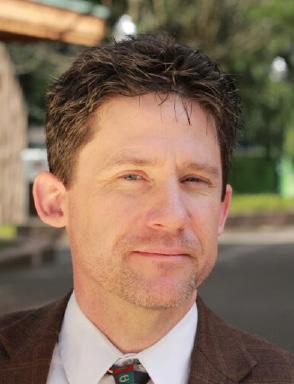
To combat this, Walsh is focused on encouraging students to cheer each other on, especially at sports matches. He wants to focus on bolstering student engagement with athletics as a way to bring the campus community together.
“I think we could probably build a lot more school pride and spirit, and kind of engage more with athletics,” he said. “That goes for club sports and especially Esports.”
Walsh is getting his start at UMW at the same time many freshmen are transitioning from high school. He says that New Student Welcome events, like Eagle Gathering, have been especially moving.
“I felt like I was being welcomed too,” he said.
He continued, “I like big events that are formative and help people feel a sense of belonging.”
“Once I interacted with him in a student centered context, I connected with him more as he is very friendly and genuinely cares about us students.”
- Abby Powers
Walsh has already created memorable moments with students across campus. Abby Powers, a junior biomedical sciences major and a member of Orientation support staff and a Peer Mentor coordinator, met Walsh during his interview process.
“Once I interacted with him in a student centered context, I connected with more as he is very friendly and genuinely cares about us as students,” she said.
So far, some of his favorite spots on campus include the bridge behind the fountain near Monroe Hall and the Zen Garden behind James Farmer Hall. Walsh invites students to come visit him anytime on the third floor of George Washington Hall.
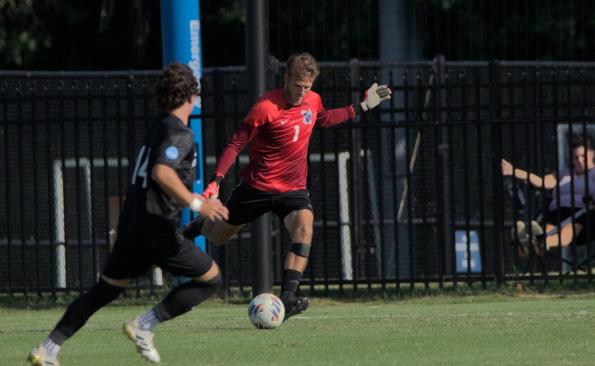
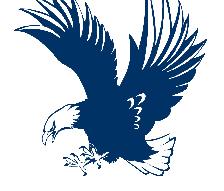
Men’s Soccer (1-1)
Sept. 5 vs. Regent University
Sept 7 vs. Washington and Lee University
Women’s Soccer (2-0)
Last Friday afternoon, the University of Mary Washington’s men’s soccer team kicked off its season by hosting Ohio Northern University at home. The UMW Eagles lost to the ONU Polar Bears by a score of 1–0.
The match started with the Eagles conceding a penalty in the first minute of the game. UMW goalkeeper Tristan Kickbush, a senior, saved the initial shot, but the Polar Bears netted the first goal of the game off a corner kick shortly after.
“Unfortunate to not get the win, but we go again on Sunday.”
- Micah Davis
“The striker was lining himself up with a sharp angle and the way he set up basically made it so he was not able to shoot to his left side,” Kickbush said. “I saw that and decided to dive to his right, making sure to get the ball away so they did not score the rebound.”
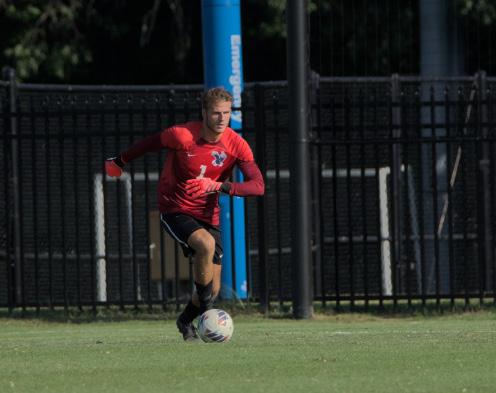
UMW failed to respond to the Polar Bear’s goal during the first half. Head Coach Jason Kilby worked with the team to regroup during halftime in an attempt to get back on track.
“We changed formations and tried different things,” Kilby said.
He also reminded the team at halftime that, “It is a completely new team we have and we are playing a much more veteran side, we are still figuring ourselves out.”
A slow start to the second half of the game followed as Ohio Northern showed strong defense and refused the Eagles’ opportunities to score. As the match went on, both teams began playing with desperation—Ohio Northern clinging to their lead and UMW trying to get onto the board with a goal. In all, seven yellow cards were handed down during the match.
The Eagles faced their final opportunity to score during a freekick on the edge of the box in the final few minutes of the game. The shot, however, hit the crossbar and the match ended in a shutout.
Micah Davis, a freshman on the team, is optimistic about the start of the season despite the team’s loss.
Like any new team working together for the first time, Kickbush says there are areas of improvement that can be focused on during practice.
“The team kept their shape well today and everyone did well,” he said. “Some things the team can work on is their technicality and awareness.”
For the freshmen on the team, playing on an NCAA affiliated roster for the first time is exciting, and they are eager to improve their skills.
“Some things the team can work on is their technicality and awareness.”
- Tristan Kickbush
“It feels good, a lot of hard work leading up to this moment,” said Davis. “Unfortunate to not get the win, but we go again on Sunday.”
The Eagles face Washington and Lee University next on Sunday, Sept. 7 at home.
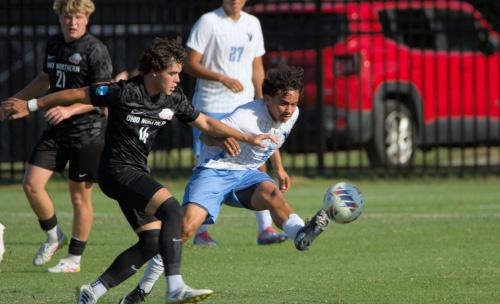
Sept. 6 vs. North Carolina Wesleyan University
Women’s Tennis (0-0)
Sept. 5 at Bill and Sandra Moore Invitational
Sept. 6 at Bill and Sandra Moore Invitational
Sept. 7 at Bill and Sandra Moore Invitational
Volleyball (0-3)
Sept. 5 at Washington and Lee University
Sept. 6 vs. Southern Virginia University
Sept. 6 vs. St. Mary’s College of Maryland